Abstract
Severe hyponatremia is associated with increased morbidity and mortality. Clinicians treating patients with severe hyponatremia are often torn between a desire to promptly raise serum sodium concentration to a "safe range," and at the same time, to avoid excessively rapid correction of hyponatremia. The aim of this study was to assess the prevalence of severe hyponatremia in hospitalized patients, the etiologic factors involved, as well as treatment and outcome of the patients using a retrospective case series. METHODS: Retrospective study of 168 patients with severe hyponatremia (< 115mmol/L) seen at Grady Memorial Hospital, a tertiary teaching hospital, in Atlanta, Georgia, from 1997-2001. The main outcome measures of interest were death during admission or occurrence of neurologic symptoms before, during or after therapy. RESULTS: One hundred sixty-eight patients met the inclusion criteria out of a total of 5994 patients with hyponatremia treated at our hospital over the study period. Eighty-nine patients (52.9%) were symptomatic. The mean absolute serum sodium at 48-hours of therapy was 120.02 +/- 8.31 mmol/L. Respiratory failure and/or hypoxia was present in 28 patients (16.7%); sepsis was documented in 16 patients (9.5%). Mortality rate was high, 34 patients died (20.2%). On multivariate analysis factors with strong association with mortality of patients with severe hyponatremia were hypoxia, presence of neurologic symptoms, slow correction rates and a diagnosis of sepsis. CONCLUSIONS: The mortality associated with severe hyponatremia remains high. Sepsis, respiratory failure and the presence of symptoms predict poor outcome in hospitalized patients with severe hyponatremia. More aggressive therapy with 3% saline may improve outcome in symptomatic patients. Our data suggest that a slow rate of correction in severe hyponatremia is associated with higher mortality than rapid correction, at least in the short-term.
Full text
PDF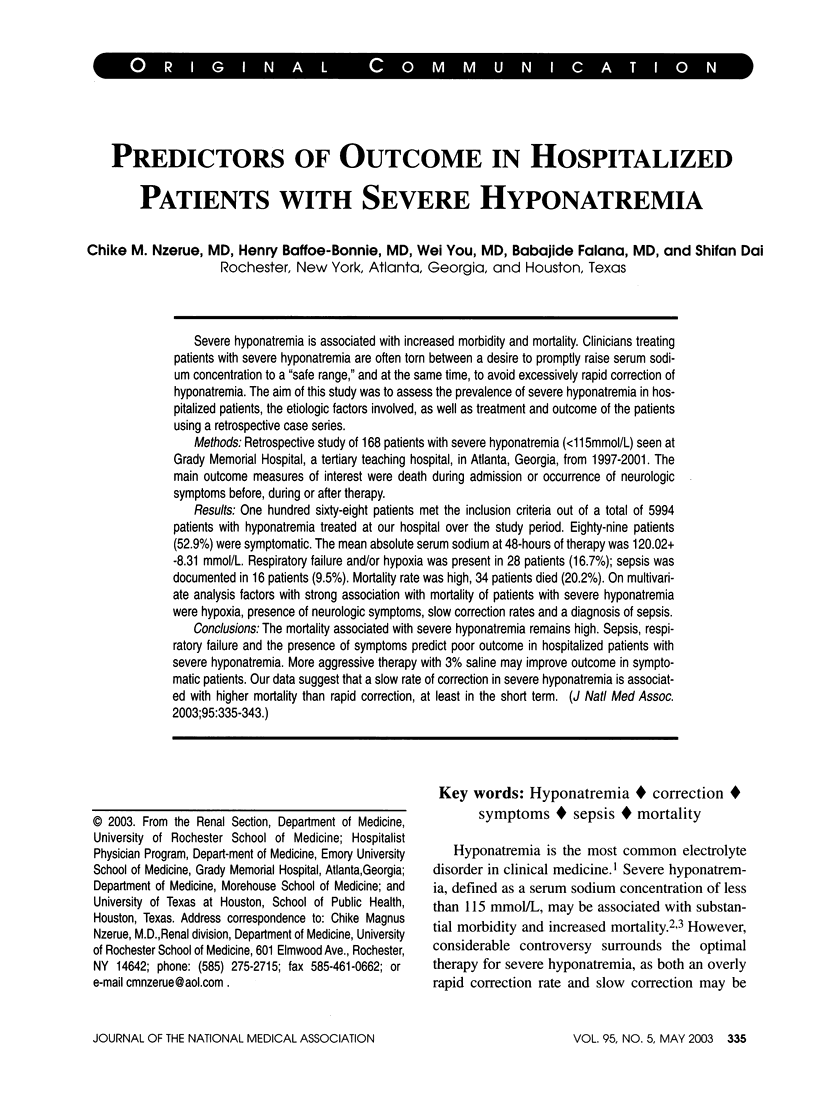
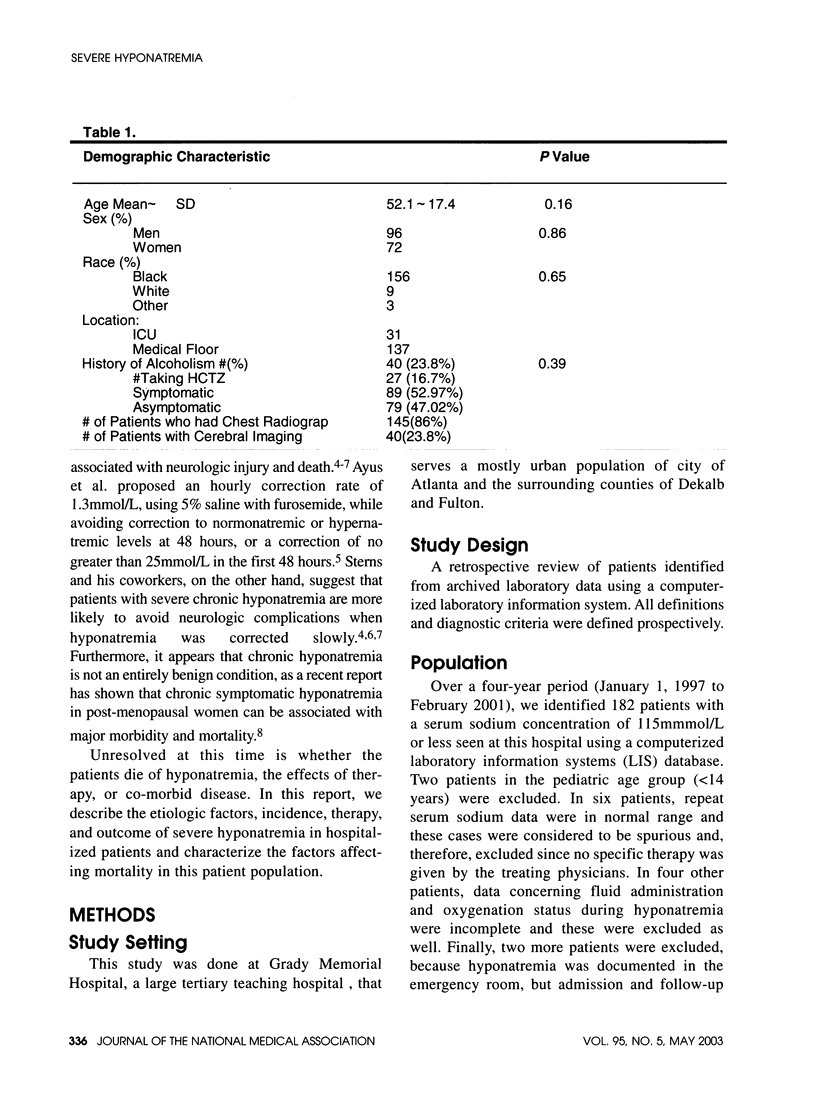
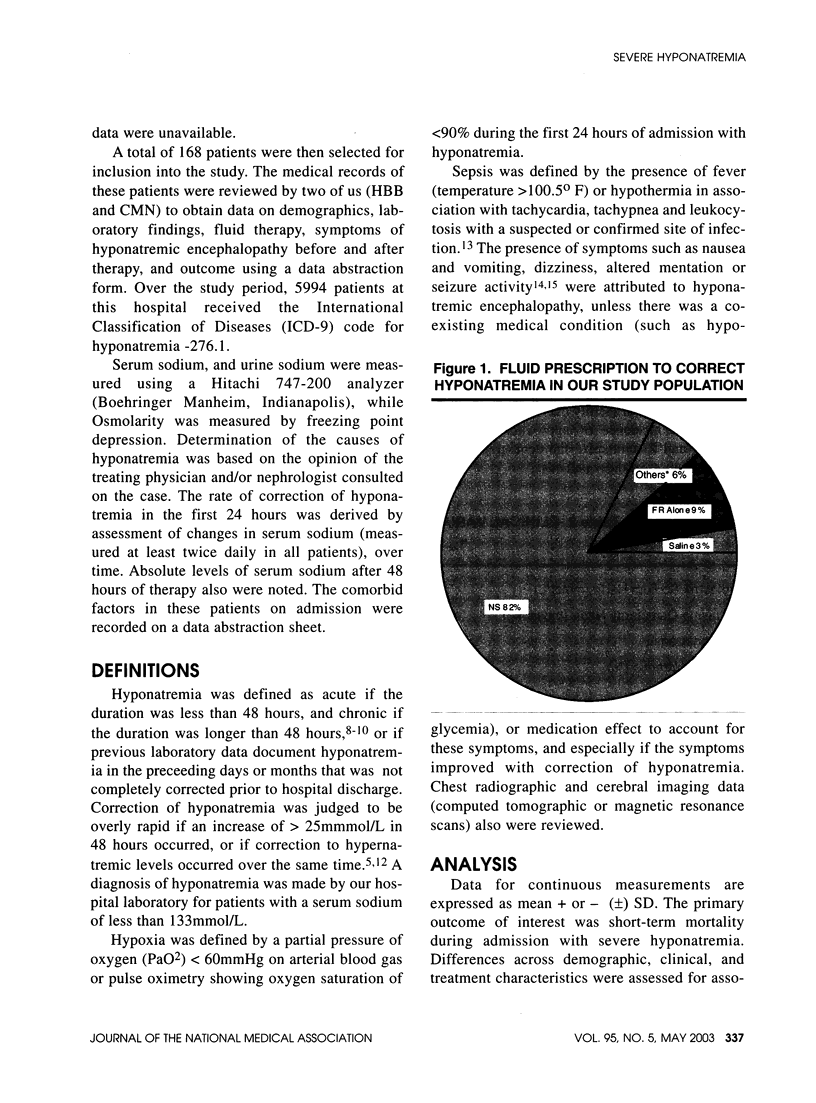
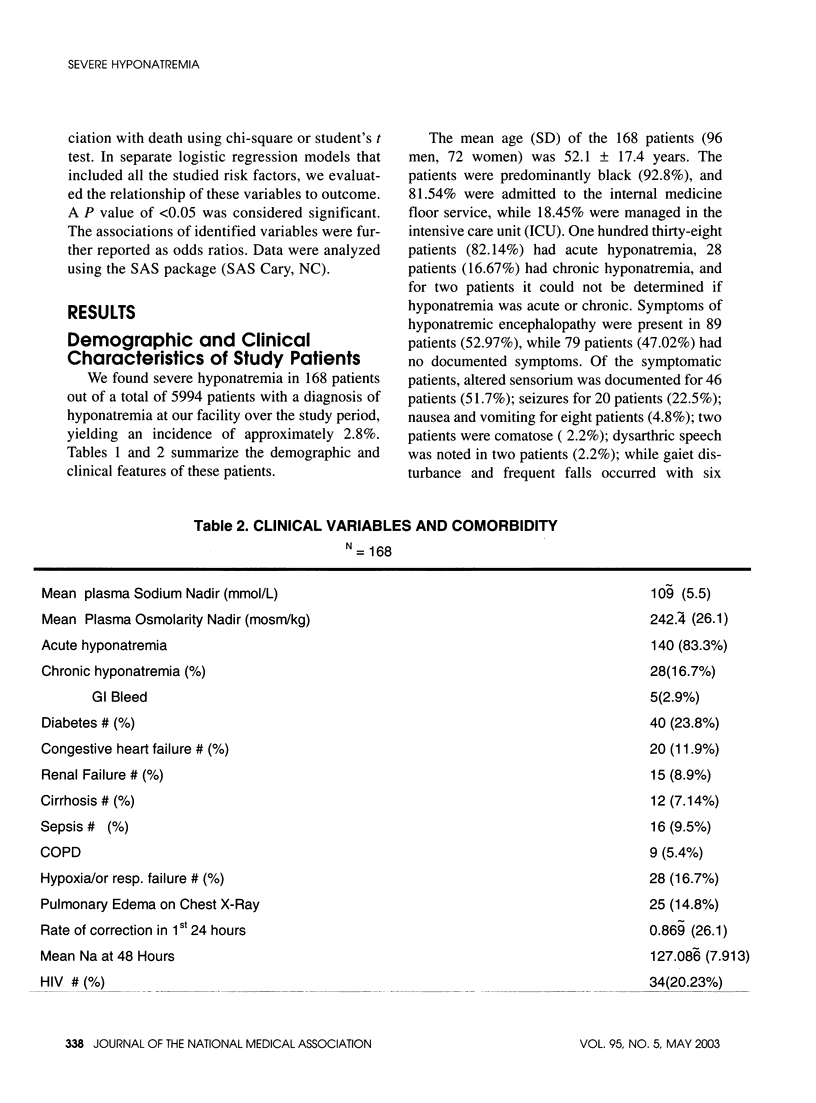
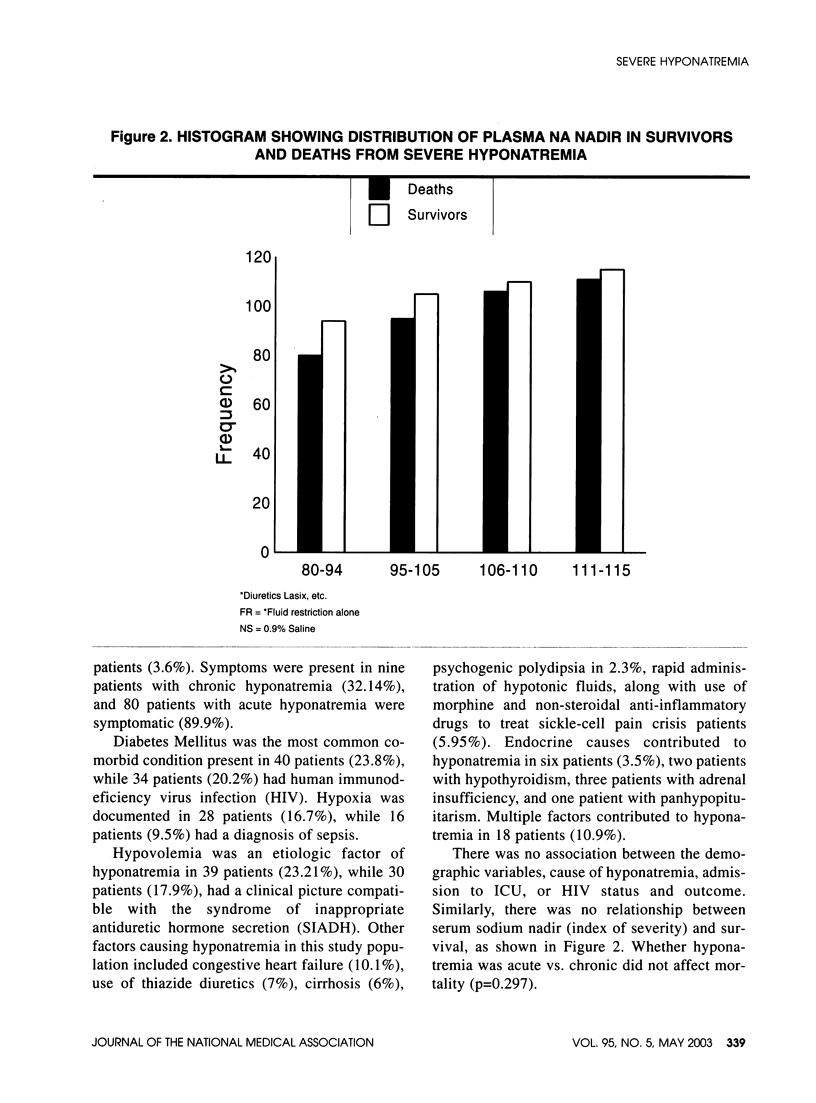
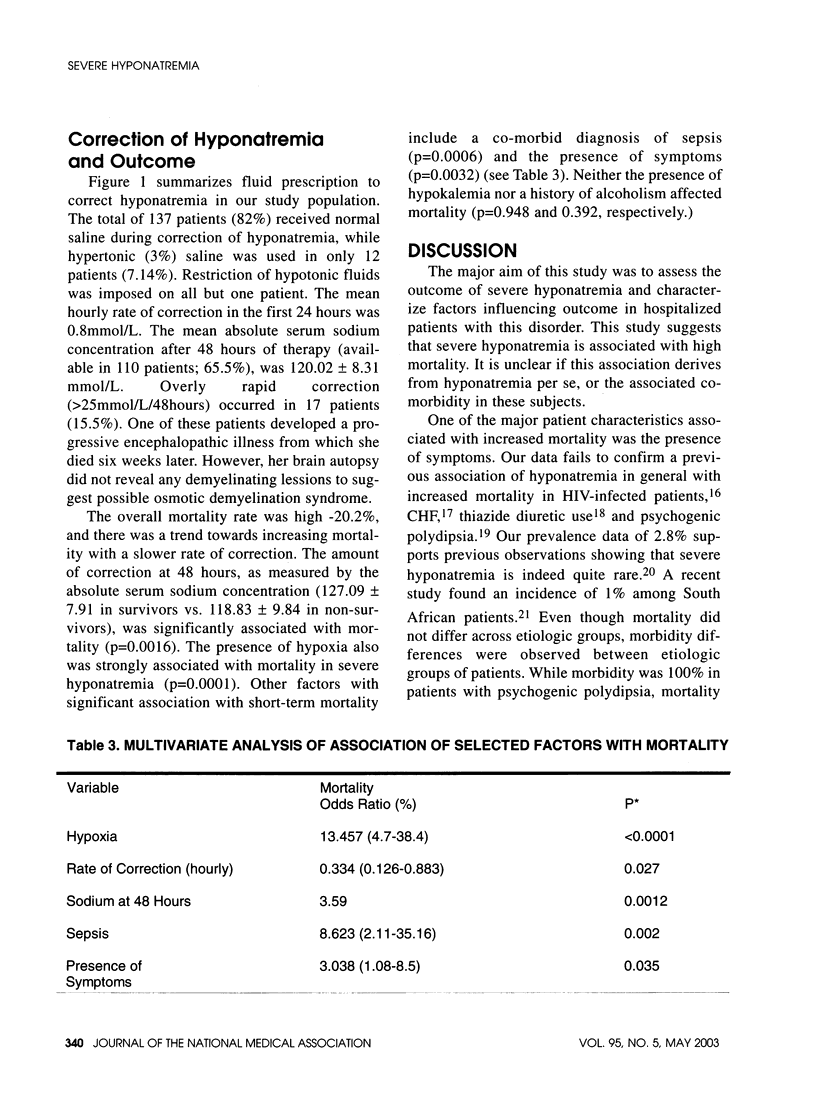
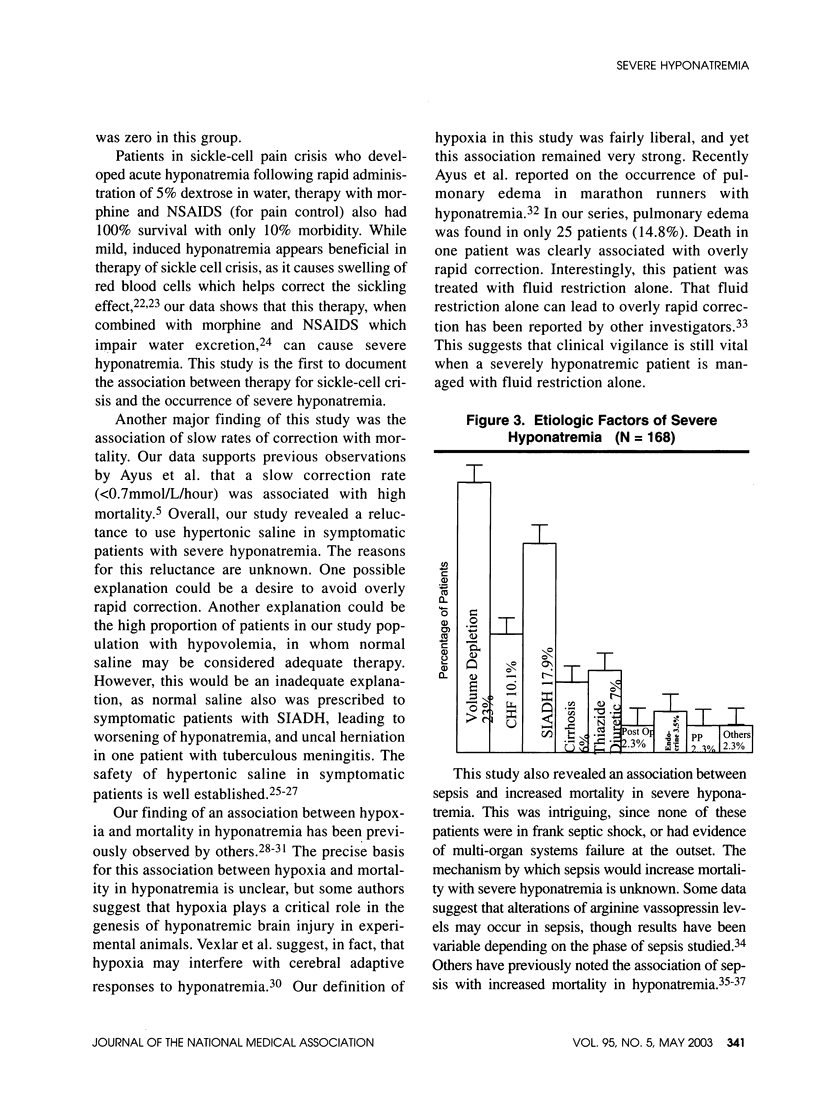
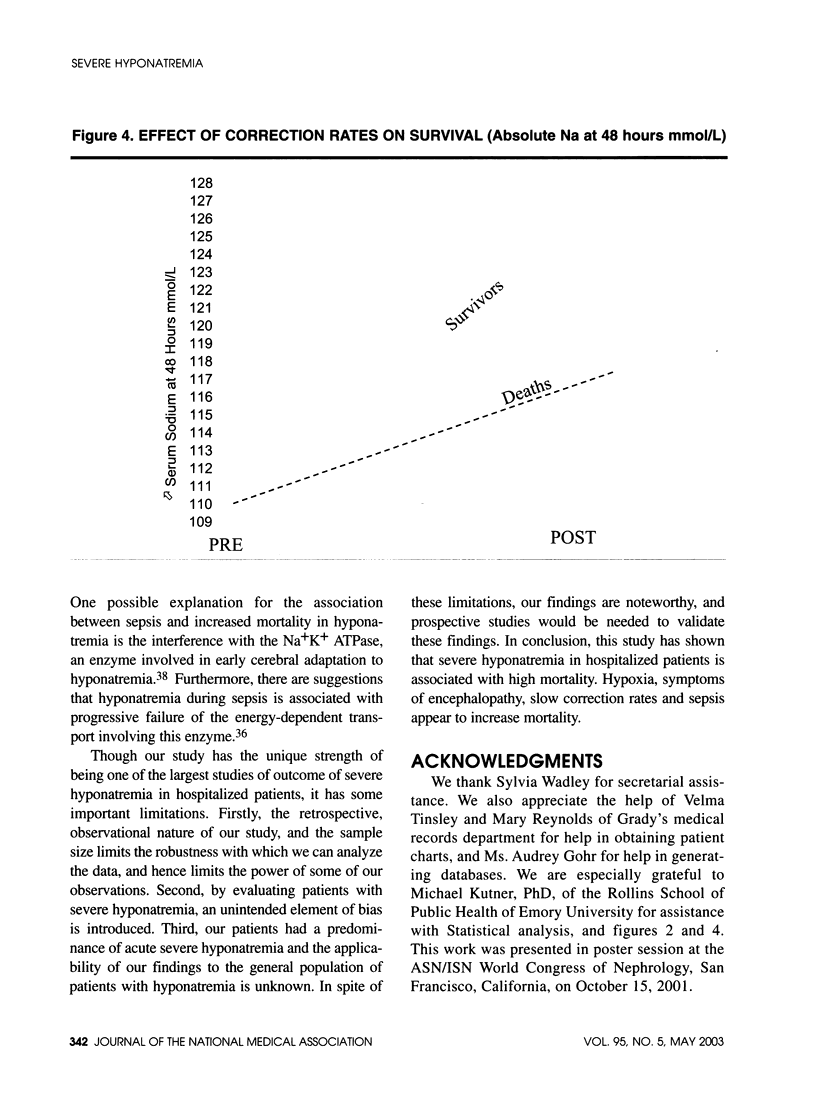
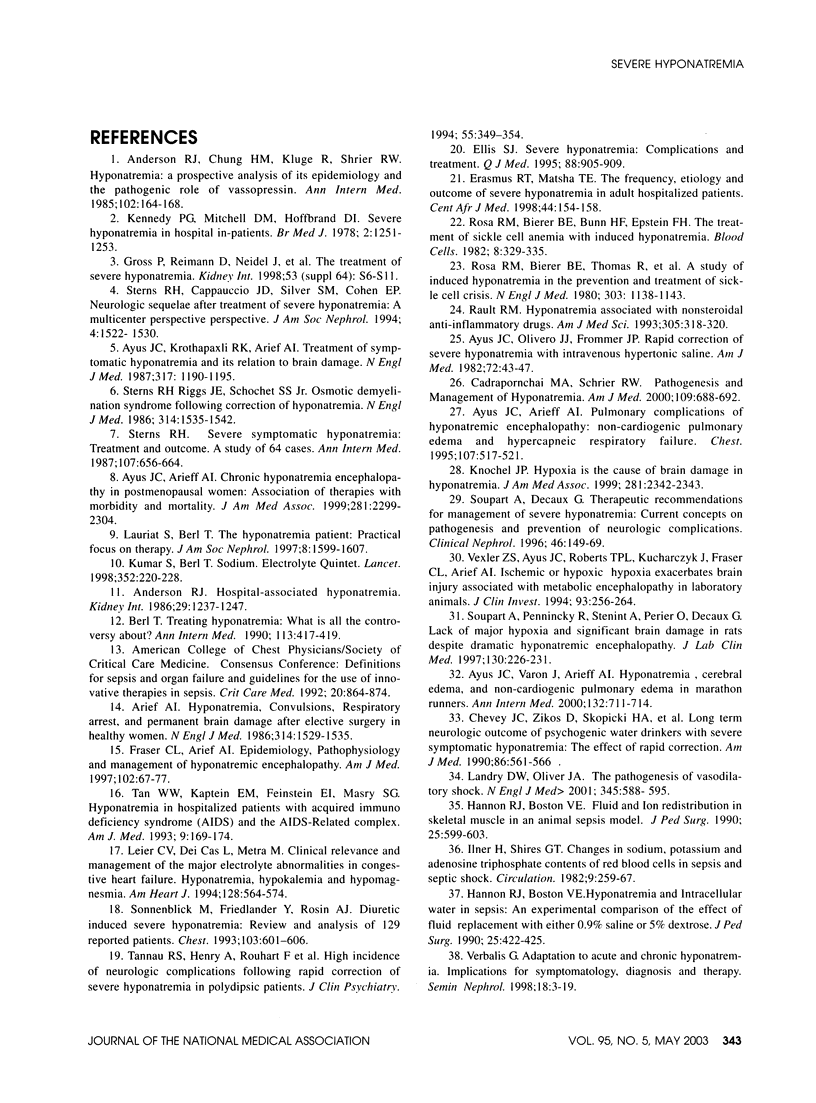
Selected References
These references are in PubMed. This may not be the complete list of references from this article.
- Anderson R. J., Chung H. M., Kluge R., Schrier R. W. Hyponatremia: a prospective analysis of its epidemiology and the pathogenetic role of vasopressin. Ann Intern Med. 1985 Feb;102(2):164–168. doi: 10.7326/0003-4819-102-2-164. [DOI] [PubMed] [Google Scholar]
- Anderson R. J. Hospital-associated hyponatremia. Kidney Int. 1986 Jun;29(6):1237–1247. doi: 10.1038/ki.1986.134. [DOI] [PubMed] [Google Scholar]
- Arieff A. I. Hyponatremia, convulsions, respiratory arrest, and permanent brain damage after elective surgery in healthy women. N Engl J Med. 1986 Jun 12;314(24):1529–1535. doi: 10.1056/NEJM198606123142401. [DOI] [PubMed] [Google Scholar]
- Ayus J. C., Arieff A. I. Chronic hyponatremic encephalopathy in postmenopausal women: association of therapies with morbidity and mortality. JAMA. 1999 Jun 23;281(24):2299–2304. doi: 10.1001/jama.281.24.2299. [DOI] [PubMed] [Google Scholar]
- Ayus J. C., Arieff A. I. Pulmonary complications of hyponatremic encephalopathy. Noncardiogenic pulmonary edema and hypercapnic respiratory failure. Chest. 1995 Feb;107(2):517–521. doi: 10.1378/chest.107.2.517. [DOI] [PubMed] [Google Scholar]
- Ayus J. C., Krothapalli R. K., Arieff A. I. Treatment of symptomatic hyponatremia and its relation to brain damage. A prospective study. N Engl J Med. 1987 Nov 5;317(19):1190–1195. doi: 10.1056/NEJM198711053171905. [DOI] [PubMed] [Google Scholar]
- Ayus J. C., Olivero J. J., Frommer J. P. Rapid correction of severe hyponatremia with intravenous hypertonic saline solution. Am J Med. 1982 Jan;72(1):43–48. doi: 10.1016/0002-9343(82)90575-7. [DOI] [PubMed] [Google Scholar]
- Ayus J. C., Varon J., Arieff A. I. Hyponatremia, cerebral edema, and noncardiogenic pulmonary edema in marathon runners. Ann Intern Med. 2000 May 2;132(9):711–714. doi: 10.7326/0003-4819-132-9-200005020-00005. [DOI] [PubMed] [Google Scholar]
- Berl T. Treating hyponatremia: what is all the controversy about? Ann Intern Med. 1990 Sep 15;113(6):417–419. doi: 10.7326/0003-4819-113-6-417. [DOI] [PubMed] [Google Scholar]
- Cadnapaphornchai M. A., Schrier R. W. Pathogenesis and management of hyponatremia. Am J Med. 2000 Dec 1;109(8):688–692. doi: 10.1016/s0002-9343(00)00622-7. [DOI] [PubMed] [Google Scholar]
- Cheng J. C., Zikos D., Skopicki H. A., Peterson D. R., Fisher K. A. Long-term neurologic outcome in psychogenic water drinkers with severe symptomatic hyponatremia: the effect of rapid correction. Am J Med. 1990 Jun;88(6):561–566. doi: 10.1016/0002-9343(90)90518-i. [DOI] [PubMed] [Google Scholar]
- Ellis S. J. Severe hyponatraemia: complications and treatment. QJM. 1995 Dec;88(12):905–909. [PubMed] [Google Scholar]
- Erasmus R. T., Matsha T. E. The frequency, aetiology and outcome of severe hyponatraemia in adult hospitalised patients. Cent Afr J Med. 1998 Jun;44(6):154–158. [PubMed] [Google Scholar]
- Fraser C. L., Arieff A. I. Epidemiology, pathophysiology, and management of hyponatremic encephalopathy. Am J Med. 1997 Jan;102(1):67–77. doi: 10.1016/s0002-9343(96)00274-4. [DOI] [PubMed] [Google Scholar]
- Gross P., Reimann D., Neidel J., Döke C., Prospert F., Decaux G., Verbalis J., Schrier R. W. The treatment of severe hyponatremia. Kidney Int Suppl. 1998 Feb;64:S6–11. [PubMed] [Google Scholar]
- Hannon R. J., Boston V. E. Fluid and ion redistribution in skeletal muscle in an animal sepsis model. J Pediatr Surg. 1990 Jun;25(6):599–603. doi: 10.1016/0022-3468(90)90342-7. [DOI] [PubMed] [Google Scholar]
- Hannon R. J., Boston V. E. Hyponatraemia and intracellular water in sepsis: an experimental comparison of the effect of fluid replacement with either 0.9% saline or 5% dextrose. J Pediatr Surg. 1990 Apr;25(4):422–425. doi: 10.1016/0022-3468(90)90385-m. [DOI] [PubMed] [Google Scholar]
- Illner H., Shires G. T. Changes in sodium, potassium, and adenosine triphosphate contents of red blood cells in sepsis and septic shock. Circ Shock. 1982;9(3):259–267. [PubMed] [Google Scholar]
- Kennedy P. G., Mitchell D. M., Hoffbrand B. I. Severe hyponatraemia in hospital inpatients. Br Med J. 1978 Nov 4;2(6147):1251–1253. doi: 10.1136/bmj.2.6147.1251. [DOI] [PMC free article] [PubMed] [Google Scholar]
- Knochel J. P. Hypoxia is the cause of brain damage in hyponatremia. JAMA. 1999 Jun 23;281(24):2342–2343. doi: 10.1001/jama.281.24.2342. [DOI] [PubMed] [Google Scholar]
- Kumar S., Berl T. Sodium. Lancet. 1998 Jul 18;352(9123):220–228. doi: 10.1016/S0140-6736(97)12169-9. [DOI] [PubMed] [Google Scholar]
- Landry D. W., Oliver J. A. The pathogenesis of vasodilatory shock. N Engl J Med. 2001 Aug 23;345(8):588–595. doi: 10.1056/NEJMra002709. [DOI] [PubMed] [Google Scholar]
- Lauriat S. M., Berl T. The hyponatremic patient: practical focus on therapy. J Am Soc Nephrol. 1997 Oct;8(10):1599–1607. doi: 10.1681/ASN.V8101599. [DOI] [PubMed] [Google Scholar]
- Leier C. V., Dei Cas L., Metra M. Clinical relevance and management of the major electrolyte abnormalities in congestive heart failure: hyponatremia, hypokalemia, and hypomagnesemia. Am Heart J. 1994 Sep;128(3):564–574. doi: 10.1016/0002-8703(94)90633-5. [DOI] [PubMed] [Google Scholar]
- Rault R. M. Case report: hyponatremia associated with nonsteroidal antiinflammatory drugs. Am J Med Sci. 1993 May;305(5):318–320. doi: 10.1097/00000441-199305000-00011. [DOI] [PubMed] [Google Scholar]
- Rosa R. M., Bierer B. E., Bunn H. F., Epstein F. H. The treatment of sickle cell anemia with induced hyponatremia. Blood Cells. 1982;8(2):329–335. [PubMed] [Google Scholar]
- Rosa R. M., Bierer B. E., Thomas R., Stoff J. S., Kruskall M., Robinson S., Bunn H. F., Epstein F. H. A study of induced hyponatremia in the prevention and treatment of sickle-cell crisis. N Engl J Med. 1980 Nov 13;303(20):1138–1143. doi: 10.1056/NEJM198011133032002. [DOI] [PubMed] [Google Scholar]
- Sonnenblick M., Friedlander Y., Rosin A. J. Diuretic-induced severe hyponatremia. Review and analysis of 129 reported patients. Chest. 1993 Feb;103(2):601–606. doi: 10.1378/chest.103.2.601. [DOI] [PubMed] [Google Scholar]
- Soupart A., Decaux G. Therapeutic recommendations for management of severe hyponatremia: current concepts on pathogenesis and prevention of neurologic complications. Clin Nephrol. 1996 Sep;46(3):149–169. [PubMed] [Google Scholar]
- Soupart A., Penninckx R., Stenuit A., Decaux G. Lack of major hypoxia and significant brain damage in rats despite dramatic hyponatremic encephalopathy. J Lab Clin Med. 1997 Aug;130(2):226–231. doi: 10.1016/s0022-2143(97)90100-1. [DOI] [PubMed] [Google Scholar]
- Sterns R. H., Cappuccio J. D., Silver S. M., Cohen E. P. Neurologic sequelae after treatment of severe hyponatremia: a multicenter perspective. J Am Soc Nephrol. 1994 Feb;4(8):1522–1530. doi: 10.1681/ASN.V481522. [DOI] [PubMed] [Google Scholar]
- Sterns R. H., Riggs J. E., Schochet S. S., Jr Osmotic demyelination syndrome following correction of hyponatremia. N Engl J Med. 1986 Jun 12;314(24):1535–1542. doi: 10.1056/NEJM198606123142402. [DOI] [PubMed] [Google Scholar]
- Sterns R. H. Severe symptomatic hyponatremia: treatment and outcome. A study of 64 cases. Ann Intern Med. 1987 Nov;107(5):656–664. doi: 10.7326/0003-4819-107-5-656. [DOI] [PubMed] [Google Scholar]
- Tang W. W., Kaptein E. M., Feinstein E. I., Massry S. G. Hyponatremia in hospitalized patients with the acquired immunodeficiency syndrome (AIDS) and the AIDS-related complex. Am J Med. 1993 Feb;94(2):169–174. doi: 10.1016/0002-9343(93)90179-s. [DOI] [PubMed] [Google Scholar]
- Tanneau R. S., Henry A., Rouhart F., Bourbigot B., Garo B., Mocquard Y., Goas J. Y. High incidence of neurologic complications following rapid correction of severe hyponatremia in polydipsic patients. J Clin Psychiatry. 1994 Aug;55(8):349–354. [PubMed] [Google Scholar]
- Verbalis J. G. Adaptation to acute and chronic hyponatremia: implications for symptomatology, diagnosis, and therapy. Semin Nephrol. 1998 Jan;18(1):3–19. [PubMed] [Google Scholar]
- Vexler Z. S., Ayus J. C., Roberts T. P., Fraser C. L., Kucharczyk J., Arieff A. I. Hypoxic and ischemic hypoxia exacerbate brain injury associated with metabolic encephalopathy in laboratory animals. J Clin Invest. 1994 Jan;93(1):256–264. doi: 10.1172/JCI116953. [DOI] [PMC free article] [PubMed] [Google Scholar]


